Social Media Marketing
Social media marketing: What it is and how to build your strategy
Jump into this comprehensive guide for crafting an effective social media marketing strategy from scratch. We offers insights into defining goals, selecting the right platforms and measuring success through key metrics.
Want to increase your team’s productivity and effectiveness with one comprehensive platform? Sprout Social all-in-one social media management tools will help you unlock the full potential of social.
Reading time 34 minutes
Published on February 19, 2025
Table of Contents
Summary
- Social media marketing involves using platforms like Instagram, X (formerly referred to as Twitter), LinkedIn, Facebook and Pinterest to promote brands and engage with customers. It encompasses promoting new products, interacting with customers through comments and creating content that reflects a brand's values and story.
- A successful social media strategy starts with setting clear and realistic goals. A few examples of goals for social media strategies are increasing brand awareness, generating leads and sales and providing comprehensive customer care.
- A data-driven approach is essential for measuring the success of a social media strategy. These metrics help brands understand audience perception and the effectiveness of their content. Some examples of important metrics to track include reach, clicks, engagement, organic and paid likes, follower growth and conversion rate.
Looking to fine-tune your social media marketing strategy? Now’s the perfect time to make it happen. In a landscape with more competition, content and networks than ever, a succinct strategy gives you the focus needed to say “no” to efforts that don’t serve your goals.
That’s why we put together a comprehensive guide to creating a social media marketing plan from scratch. Whether you’re new to social or want to double-check your priorities in 2025, this guide has you covered.
What is social media marketing?
Social media marketing means using social media platforms like Instagram, X (formerly known as Twitter) and Facebook to promote your brand and sell your product or service.
If your business comes out with a new item and you plan to promote the launch on social media, that’s social media marketing. If you interact with your customers via comments, that’s social media marketing. And if you create engaging content that showcases your brand’s values and story, that’s social media marketing too.
This form of marketing requires you to use social media management skills and tools. Just as you prepare other aspects of your marketing strategy, you need to have a plan for your social media marketing.
Honing your strategy is easier with the right tools. See how Sprout Social can help with a 30-day free trial.
What’s new about social media marketing in 2026?
Social media marketing is poised to get even bigger results than ever. Data from our 2026 Social Media Content Strategy Report shows consumers of all ages are engaging more than ever with brands on social media.
But when it comes to 2026 priorities, consumers and marketers are on slightly different pages. For example, the report found that while consumers want brands to make human-generated content their #1 priority, marketers are making AI-generated content a top investment (especially marketing leaders). And while consumers want brands to make personalized customer service their #2 priority, it doesn’t show up at all in marketers’ priorities.
One way to invest in human-generated content is via influencer marketing. Influencers will continue to be a driving force for brands in 2026 and beyond as they integrate influencer content more intentionally for a more effective multi-channel approach. This will include edutainment, i.e. content that educates and entertains, which is also poised to be the most engaging of all brand content on social.
Brands like UK-based financial giant Barclay’s are already engaging their audiences with educational content on their social media to meet consumers where they are and build brand trust.

What is a social media marketing strategy?
A social media marketing strategy is a comprehensive plan that integrates your social media efforts with your team’s goals and broader business objectives. This alignment ensures that your activities are optimized for performance and deliver measurable results that contribute to your overall marketing success.
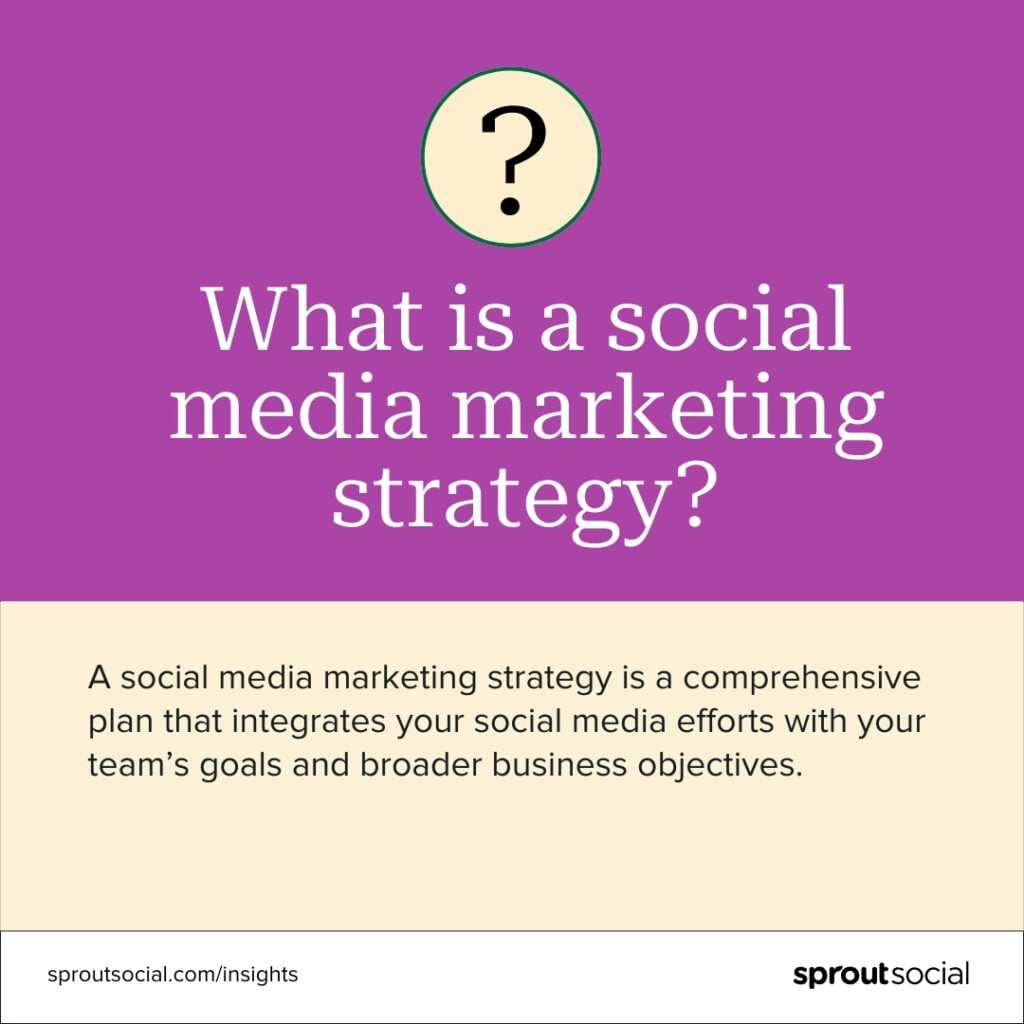
A well-defined social media marketing strategy also sets clear boundaries around your team’s time and expertise. Social media is a unique channel, and while nearly everyone uses it, this widespread usage often leads people to overestimate their expertise.
Social media managers often face requests to share content that doesn’t align with the overarching strategy or audience interests. Not to mention proving social media ROI to ensure leadership teams can see the value of social and its benefits in terms of reach and revenue. Having a defined social media strategy helps navigate such requests, and so does having clearly defined metrics to prove the impact of social to executives.
A social media management tool with capabilities such as Social Listening, Post Scheduling and Analytics and Reporting can help with this by enabling social teams to stay targeted and impactful.
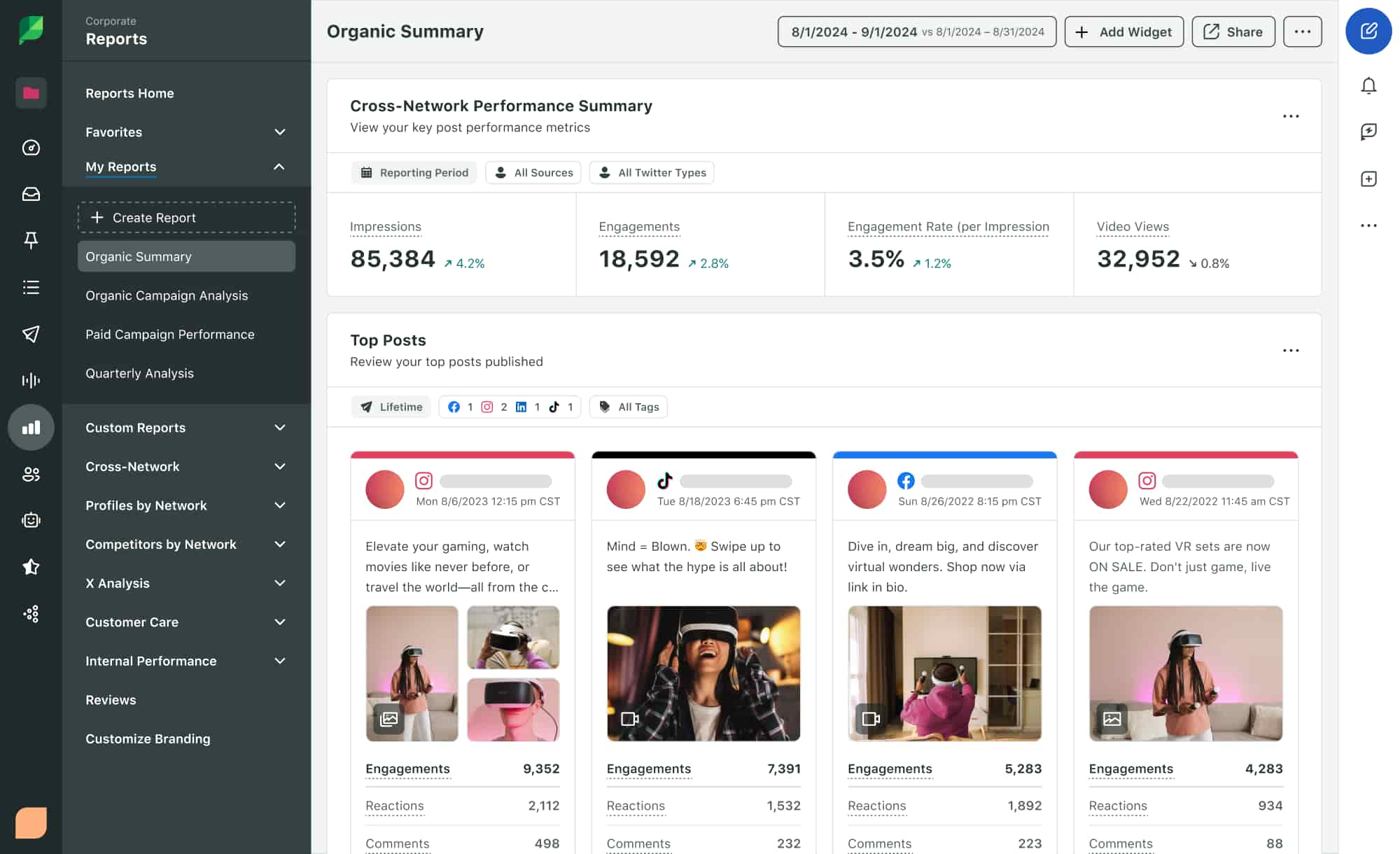
Why should you have a social media marketing strategy?
This question can feel like a bit of a no-brainer to marketers that live and breathe social.
Building a sustainable social media strategy requires understanding both current best practices and the context of social, a perspective Sprout has developed over 15 years helping brands succeed.
That said, being able to clearly articulate the advantages of a cohesive social media strategy is crucial for securing buy-in from other stakeholders.
Here’s how a well-defined social media strategy benefits your brand and business:
It increases brand awareness and engagement
According to The 2025 Sprout Social Index™, 90% of consumers use social media to keep up with trends and cultural moments.
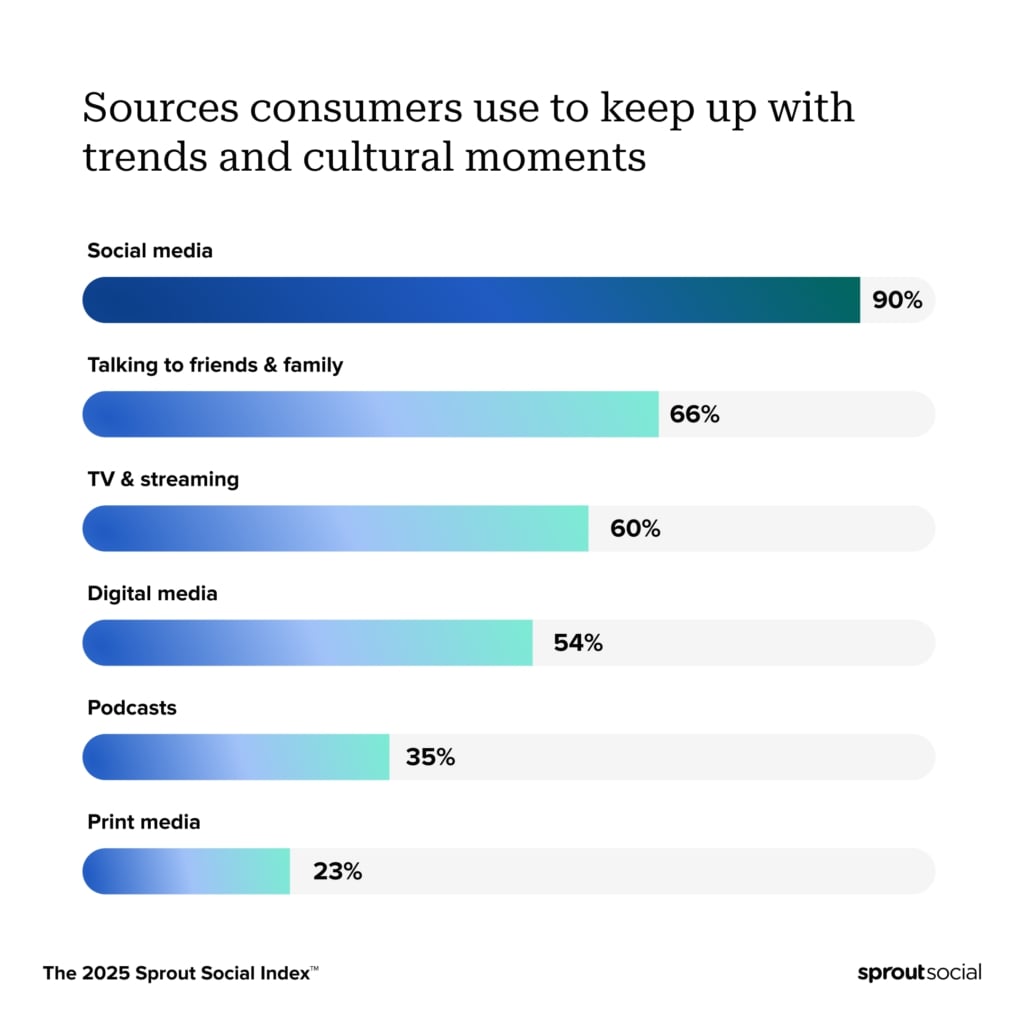
Amid a fractured cultural landscape, social media has emerged to fill a seemingly endless need for content. And when brands commit to a cohesive social media marketing strategy, they develop the consistency needed to form a brand identity that cuts through the noise to resonate with a target audience.
Success in a crowded feed often comes down to brands using cultural moments to stand out in content, allowing them to stay relevant in real-time conversations.
The rise of influencer marketing has further enabled brands to deepen their reach and drive meaningful engagement. According to the Q1 2025 Sprout Pulse Survey, 90% of marketers reported that sponsored influencer content performed better in terms of engagement compared to organic content posted on their brand accounts.
It promotes brand trust and authenticity
Social’s impact on brand trust is palpable, particularly for younger consumers. According to a Q2 2024 Sprout Pulse Survey, 78% of consumers surveyed agree that a brand’s social media presence has a larger impact on whether or not they trust that brand. That number goes up to 88% for Gen Z. What influences that trust the most? The content you post on social.
But having a social media presence isn’t enough. Consumers also want authentic content from brands they follow. The 2025 Sprout Social Index™ showed consumers rank authenticity and relatability as two out of the three most important brand content traits.
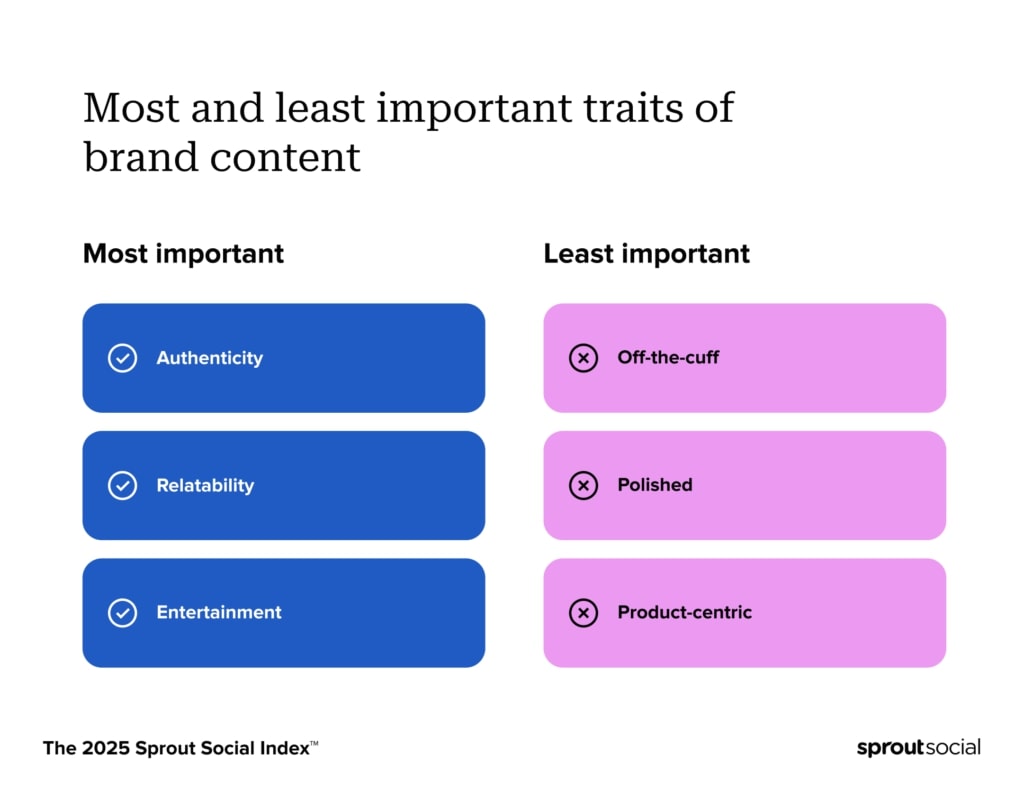
It supports performance measurement
Your social media marketing strategy creates the infrastructure needed to prove the ROI of your efforts. Without one, you may be able to report on social media KPIs, but it’ll be much harder to showcase how they align with strategic objectives.
For example, say you work with an automotive brand and one of your top business objectives is to increase market share with parents of young children. With that in mind, you can develop a strategic content pillar around this specific audience, and report on the performance of those posts over time.
With a social listening tool, you can even measure how your brand’s share of voice stacks up against key competitors. This is a highly effective way to gauge your brand’s visibility and market share within your industry.
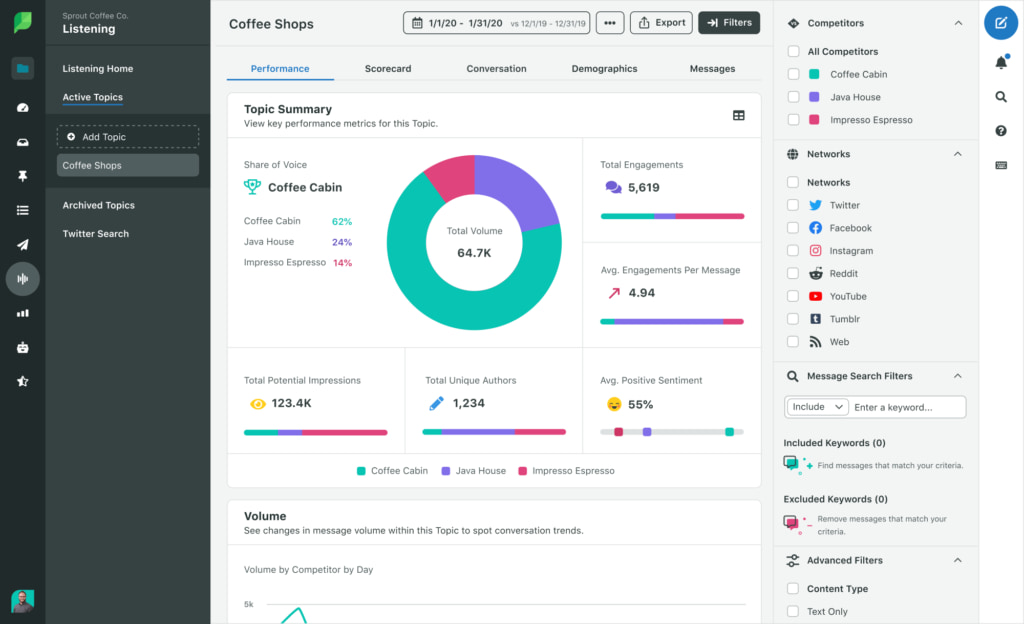
Learn more about social listening tools
It drives revenue
Our Q2 2024 Pulse Survey also found that social media is the top channel for product discovery, with 81% of consumers surveyed using the channel to shop around for their next purchase.
As social commerce adoption continues to skyrocket in the US and abroad, social media now supports a full-funnel experience. Even B2B brands are using social media to enhance lead generation and drive pipeline growth.
For example, when Simpli.fi, an advertising success platform, integrated employee advocacy into their social media strategy, the company realized $90,000 in earned media value in three months.
Benefits of social media marketing for your business needs
Social media marketing transcends industries and offers businesses a dynamic platform for brand amplification, customer engagement and strategic growth. From healthcare to retail—social media marketing fosters competitive agility and cultivates brand awareness and trust to drive sustained market influence.
It also provides key social data that gives businesses nuanced audience insights in almost real-time. These insights can influence the entire organization through customer-centric data.
Plus, because social media marketing enables quick and hyper-targeted access to your demographic at a fraction of the time and cost traditional marketing takes, it drives a more enhanced ROI for the business.
We spoke to Penn State Health, a multi-hospital academic health system serving the central Pennsylvania region to understand how social media has been instrumental in enabling them to achieve their business goals.
Appeal to social-savvy customers
To say that social media has transformed the way customers interact with a business is an understatement. Most customers are social-savvy today. Even Baby Boomers are on social media for news, entertainment and brand interaction. According to The 2026 Content Strategy Report, over 25% of Baby Boomers plan to use YouTube more in 2026, and another 40% plan to use Facebook more often.
The popularity of user-generated content, influencers and content creators has further bolstered experience-focused brand interactions that consumers crave.
This has leveled the field between B2C and B2B brands. You need to meet consumers where they are in their fast-paced lives—and social gives them that opportunity.
As Amy Peiffer, social media lead at Penn State Health aptly puts it, “People’s needs extend well beyond nine to five when somebody is in a clinic office picking up a phone and when people need answers to their questions. Often they go to social media because it’s the communication platform that they’re most familiar with and meets them at the times that they are working nine to five themselves. They may not necessarily have time to pick up the phone during the day.”
As with all regulated industries, the Penn State Health social team adheres to strict protocols when communicating with patients or caregivers on social. HIPAA regulations mean it does not answer specific health condition questions on social. However, the team is able to direct audiences to the right resources to ensure they get all the support they need.
“While healthcare is a highly regulated field that limits all we can use social media for, it at least allows us to be an intermediary to connect people to the right resources at the right times,” Peiffer explains.

Uncover industry trends in real-time
Social media is a goldmine of business intelligence made up of unfiltered, real-time conversations between consumers and brands, all of which you can tap into with Social Listening. With social listening, you can uncover trends and themes that reveal everything from customer favorites to areas where your company is falling short. This enables you to take action based on customer feedback.
Sprout’s Listening tool also uses AI social media sentiment analysis so you can identify positive, negative and neutral chatter around you. You can automatically tap into negative brand mentions in comments and DMs to get targeted insights into where exactly you need to improve.

Get comprehensive competitive analysis
Perhaps one of the most valuable social media business benefits is the ability to study your competitors. You can use competitor analysis tools to help you understand your competition. What are they currently promoting? What sort of ads are they running? How is your content strategy different from theirs? By conducting social competitive analysis, you can uncover opportunities to experiment with your own content or advertising.
For example, maybe you notice that your competitors are crushing it with Facebook Ads but their Instagram presence is lacking. In turn, you might explore influencer marketing or user-generated content campaigns for the sake of standing out from the crowd.
You can look at your competitors’ social performance in a cinch with Sprout’s tools. Our competitor and sentiment analysis reports allow you to monitor growth and engagement to ensure that you aren’t falling behind.
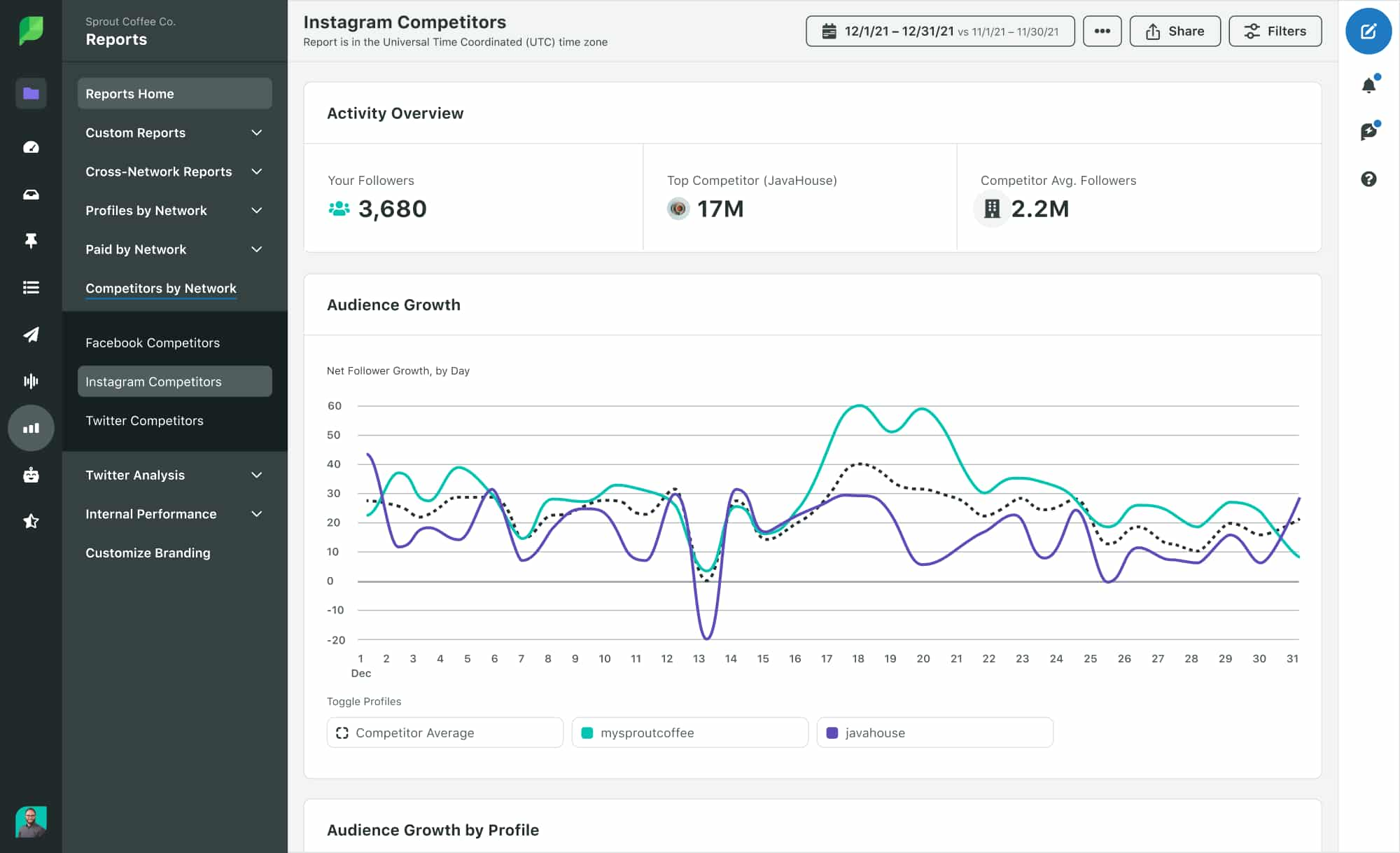
Through this analysis, you can also discover which pieces of your own content are earning the most engagement. Understanding your top-performing content is key to understanding how to break through the noise in your industry.
Provide better customer service
Customers expect quick communication and authentic engagement from brands when they reach out to them for grievances or solutions. And businesses understand this. They know they need to go beyond expectations to deliver social customer service that supports long-lasting relationships.
According to the Sprout Social Index™, 53% of brands say customer service contributes to the organization’s social strategy. With more people using social media today, brands can have meaningful, forward-facing conversations with customers easily.
Extend brand reach and engagement
Another crucial benefit of social media marketing is that it helps you enhance brand engagement through employee advocacy. Our data shows that posts employees share have an 8x higher engagement rate than brand content. Plus, employee content has 20x greater reach than all organic channels combined. Take a listen to the video below to learn more.
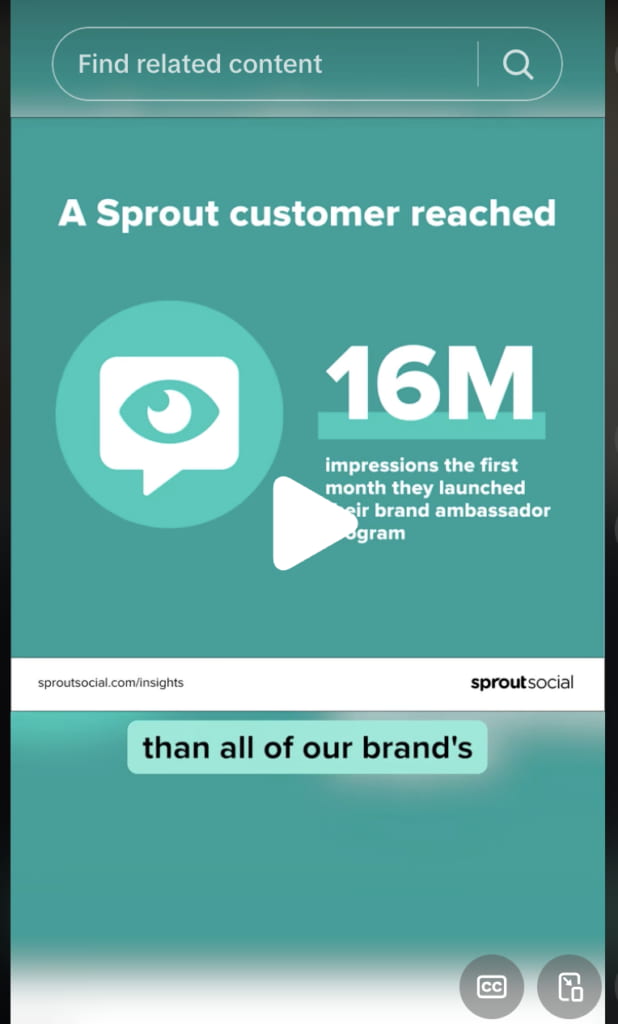
Gain more top-of-funnel leads
Securing more top-of-funnel leads is another key social media business benefit. Billions of people are active on social media daily and there’s a large chance your audience is already online. Whether through paid ads or content promotion, you can attract more top-of-funnel leads by raising awareness for your brand.
Having a social presence introduces people to what you’re selling and represents another way to score more sales. Even if these leads don’t make purchases directly through social, raising awareness could lead them to become full-fledged buyers later on. After all, they can’t buy until they know your brand exists.
Take advantage of SEO to supercharge your brand
Consistently publishing on channels relevant to your business signals that you’re active and open to new customers.
Social also enables you to tap into the power of social media search engines when someone looks up your brand. Shares and click-throughs via social represent positive search signals to Google, making social a sizable traffic source. You can track your social traffic with tools like Google Analytics.
Don’t neglect social media as a content distribution channel. A popular piece of content that scores hundreds of likes and shares can drive serious referral traffic to your site. Plus a piece of content that ranks high on the Search Engine Results Page (SERP) can bring in traffic too. You can optimize your social scheduling with Sprout’s patented ViralPost technology that ensures you’re utilizing optimal send times.
Extend your media and investor relations efforts
Social media has transformed so many industries, and communications professionals are familiar with the impact of these online spaces. Brands aren’t limited to traditional mediums like radio and print newspapers—you can use social media to supercharge your media relations and investor relations strategies.
Journalists use networks like X to find sources and potential stories, so meet them where they are. Follow and engage with journalists who report for your publications of interest to build rapport. Then when the opportunity arises, you can pitch to them.
Along with connecting with journalists and publications, you can bolster company announcements and accomplishments through social posts to catch the eye of investors. Similar to job candidates and reporters, investors use social media to learn about brands.
How to create a social media marketing strategy
Now that we’ve seen the critical ways social media marketing can elevate your business, let’s walk through how to create a plan.
Here’s our six-step process for developing a social media marketing strategy that drives results.
Step 1: Set goals and establish KPIs
Social media strategy planning starts with your goals. Whether you want to expand your team, build a larger following, or a more active community, taking the time to define your social goals is the first step to reaching them.
The goals you set will inform the key performance indicators (KPIs) you track, and how much time and energy you’ll need to dedicate to your campaigns.
Example social media goals for 2025 and beyond
What really matters is that you set realistic social media goals. We recommend tackling smaller objectives that allow you to scale your social efforts in a way that’s both reasonable and affordable.
Below are some examples of social media marketing goals that businesses of all shapes and sizes can pursue.
Goal example 1: Increase brand awareness
Brand awareness means getting your name out there. According to the Index, 93% of consumers agree it’s important for brands to keep up with online culture.
Try to avoid solely publishing promotional messages and strike a good balance with authentic content that emphasizes your brand’s voice and story. The Index further found consumers favor brands that post original content and interact regularly with their audience.
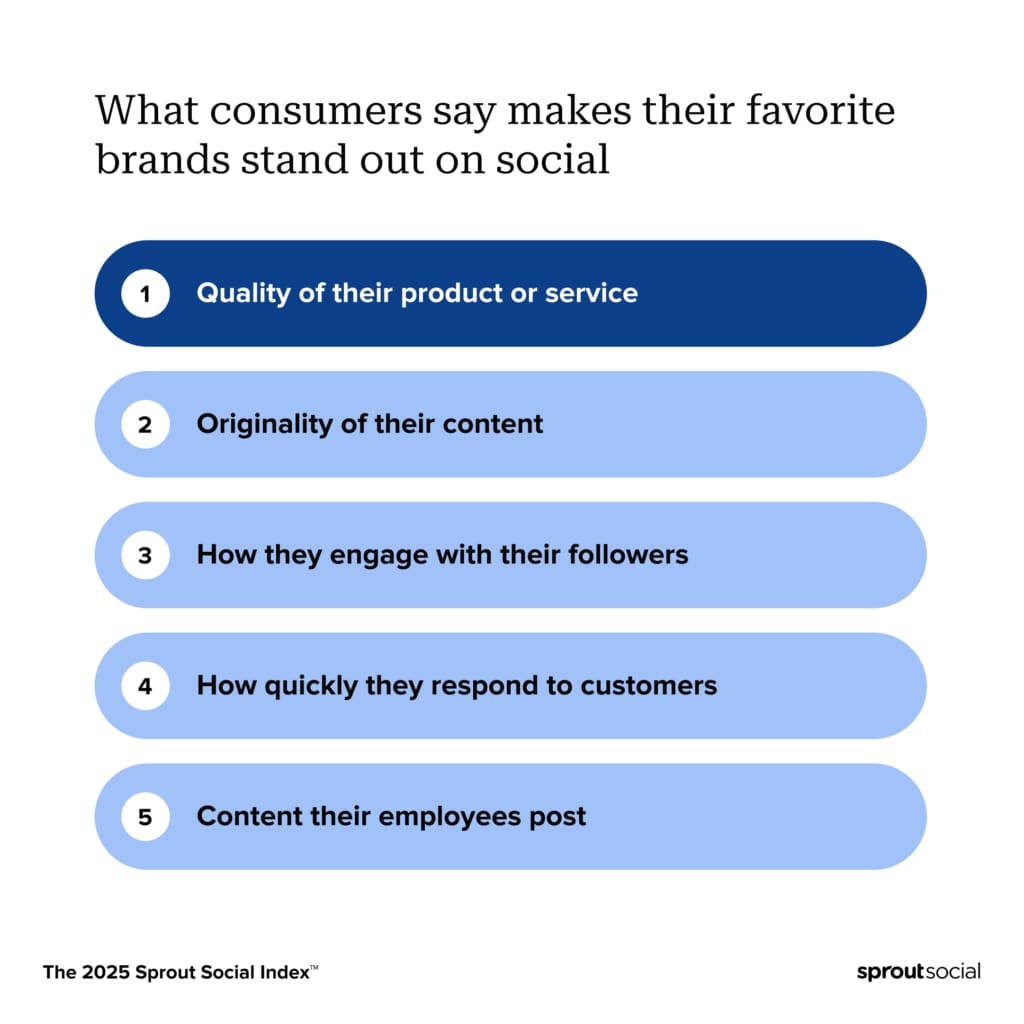
For example, in this TikTok video, Sani, a family-owned apparel company features a day in the life of the brand’s founders while visiting India for business.
If you want to increase brand awareness, here are the social media metrics you’ll want to focus on:
- Reach: Post reach is the number of unique users who saw your post. How much of your content actually reaches users’ feeds?
- Impressions: At the post level, impressions are how many times a post is displayed to someone. Impressions are a good indicator of how popular a piece of content is, and that people may be viewing a post multiple times.
- Hashtag performance: What were your most-used hashtags? Which hashtags were most associated with your brand? Having these answers can help shape the focus of your content going forward.
- Video views: This may come off as a vanity metric. But on certain channels, like TikTok, views count as impressions and are therefore important to monitor.
As you define your objectives and define these goals, it’s also important to consider the role of both organic and paid social media in your overall strategy.
Goal example 2: Generate leads and sales
Whether online, in-store or directly through your social profiles, followers don’t make purchases by accident. For example, are you alerting customers about new products and promos? Are you integrating your product catalog into your social profiles? Are you running exclusive deals for followers? Social media gives you an avenue to generate revenue.

Here are the metrics you’ll want to track if you’re focused on lead generation and sales:
- Conversions: A conversion is when someone takes a desired action, like purchasing something from your site or signing up for an upcoming event.
- Conversion rate: Conversion rate measures how well your social ad or campaign is convincing people to take a desired action.
- Influencer ROI: This will tell you the revenue or profit you gain compared to the cost of the investment
- Employee Advocacy: This metric will tell you how many leads you generated from employee-promoted content
- Return on ad spend (ROAS): ROAS will inform on how your campaigns and ads are performing
Goal example 3: Grow your brand’s audience
Bringing new followers into the fold means finding ways to introduce your brand to folks who haven’t heard of you before. Growing your audience also means discovering conversations around your business and industry that matter the most.
Digging through your social channels is nearly impossible without monitoring or listening for specific keywords, phrases or hashtags. Having a pulse on these conversations helps you expand your core audience (and reach adjacent audiences) much faster.
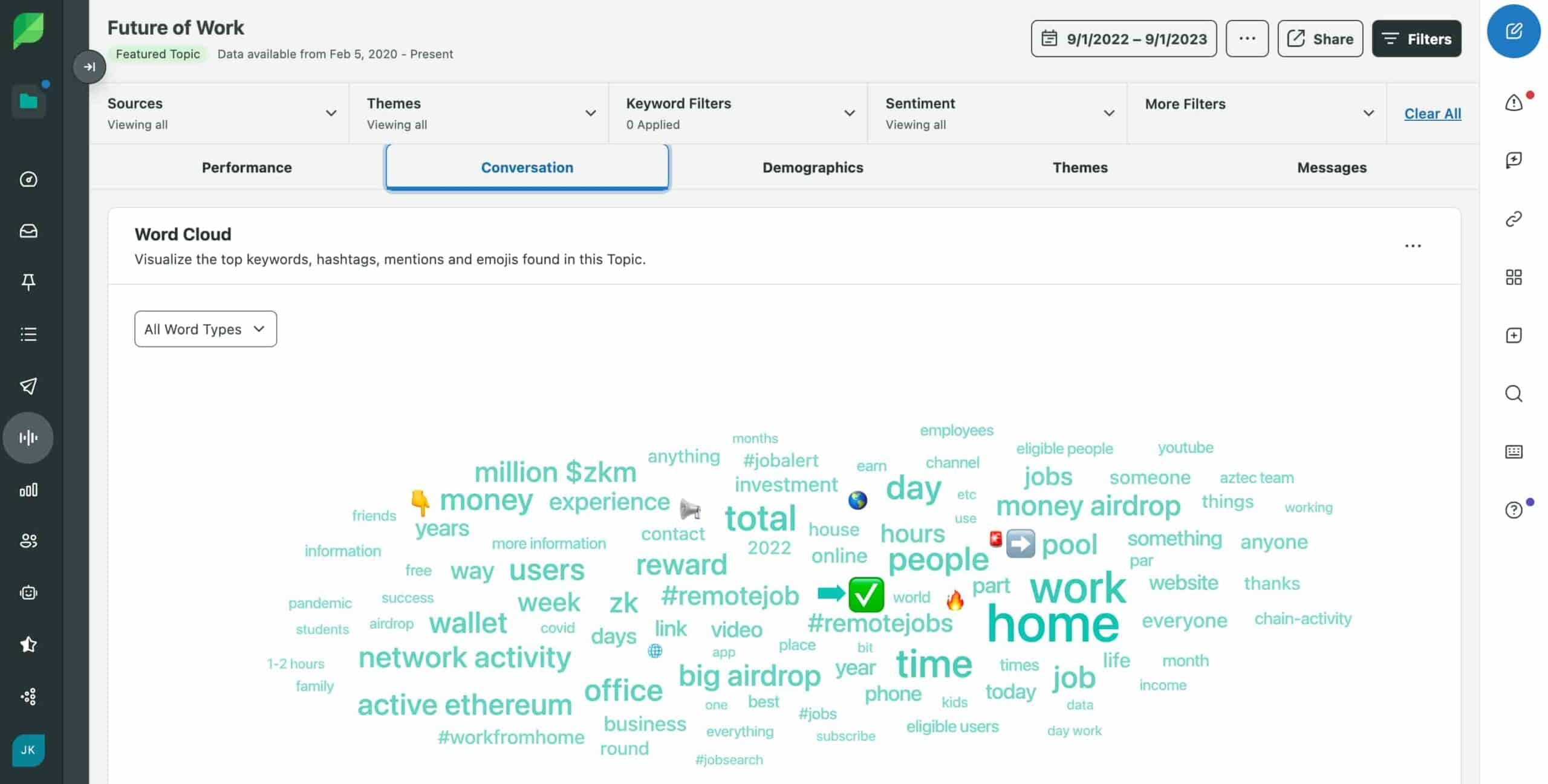
Important audience growth metrics include:
- Follower growth: Your follower growth measures the net new followers you gained in a specific time period.
- Follower growth rate: The percentage that shows you how quickly your audience is actually growing—or slowing—within a certain time period.
Goal example 4: Provide holistic customer care
The Index shows most consumers believe the most memorable thing a brand can do on social media is respond to customers.
This means companies need to experiment with messaging and content when approaching customer care. For example, does your team have a protocol for handling @-mentions and comments? Do you have templated responses to FAQs? Does your brand promote user-generated content and hashtags? Your customers can be your best cheerleaders, but only if you give them a reason to grab the megaphone.
If you want to improve your business’ approach to social customer care, here are the customer service metrics you need to track:
- Average first reply time: The time it takes for your team to send out the first reply to an inbound customer message within business hours.
- Reply or response rate: The rate that brands respond to messages or comments that they receive on a daily basis.
- Resolution rate: The percentage of customer inquiries that are fully resolved. This metric can reveal how equipped your entire company is to address customer inquiries.
Goal example 5: Drive traffic to your site to illustrate the ROI of social efforts
The Index shows that marketing leaders plan to measure social media success with overall engagement, audience growth, social interactions, web visitors and share of voice.

If you’re laser-focused on generating leads or traffic to your website, social media can make it happen. Whether through organic promotional posts or social ads, keeping an eye on the following metrics can help you better determine your ROI from social media:
- Website traffic: Monitoring website traffic can help you properly attribute increases to specific campaigns or viral posts.
- Social media referral traffic: This describes people who visit your website directly from social media pages and posts.
Any combination of these goals is fair game and can help you better understand which networks to tackle, too. When in doubt, keep your social media marketing strategy simple rather than complicating it with too many objectives that might distract you. Pick one or two and rally your team around them.
Bonus resource: A great deck can bridge the gap between raw social data and direct business value. Use this presentation template to pitch a compelling vision for your next campaign, initiative or annual strategy
Step 2: Research your target audience and select your networks
Making assumptions is bad news for marketers. Both leaders and practitioners can disprove assumptions from the valuable insights social data provides. With the right tool, marketers can quickly research their audience. No formal market research or data science chops are necessary.
What you need to know about your audience to influence your social media marketing strategy is already available. You just have to know where to look.
Remember: Different platforms attract different audiences. Social media demographics and benchmark statistics are great for understanding where your target audience lives, but it’s also important to understand the nuances of each social network so you can decide where your business needs to be.
Even further, marketers should look beyond demographics and analyze the specific social media consumer behavior that influences how their audience moves from discovery to purchase.
For the sake of narrowing down where you should spend your time, below is a quick overview of each of the major social platforms:
X/Twitter
Requiring minimal setup and providing a place to go back and forth with followers directly, there’s a reason why X remains one of the go-to platforms for customer service. If you’re trying to master the social media marketing basics of hashtags, tagging, brand voice and social media etiquette, look no further.

With more than 3 billion users, Facebook is the world’s leading social media platform. It should be a part of your customer service strategy and marketing campaigns regardless of whether you’re a B2C or B2B business. The platform’s algorithms are much more sophisticated today and focus on showing users the most relevant, meaningful content based on inventory, signals, relevancy scoring and other factors.
Plus with Meta investing in expanding advertising features within its short-video format feature Reels, the platform is poised to become a major network gone far beyond its humble origins of being a medium for social networking.

Instagram is a network centered around visual content. From eye-popping photos to clever captions, it’s all about finding unique ways to show off what you’re selling.
Whether you’re a regional business or one with a global presence, the platform offers you the creativity to explore different types of content to reach your audience.
Check out how Australian garden center chain Bunnings uses Instagram to promote its products.

Threads
When Meta released Threads on July 5, 2023, the social network received over 100 million registrations less than a week after its launch, making it the most rapidly downloaded app ever. The launch of Threads sparked conversations about its role in the fediverse, or decentralized social media.
But, for now, Threads is a text-based social network that users can sign up for through their current Instagram account. Users can post on mobile, but Threads is also available on desktop. Threads are great for brands who already have Instagram accounts because the sign-up process is pretty seamless.

LinkedIn is a network laser-focused on business trends and networking, and so a goldmine for anyone networking in the B2B space. Looking to get in touch with an influencer, marketing manager or CEO? Chances are you can find them here.
However, the benefits of LinkedIn marketing go beyond networking, such as content distribution and lead generation. We also have a guide for LinkedIn best practices so you can get full advantage of those benefits.
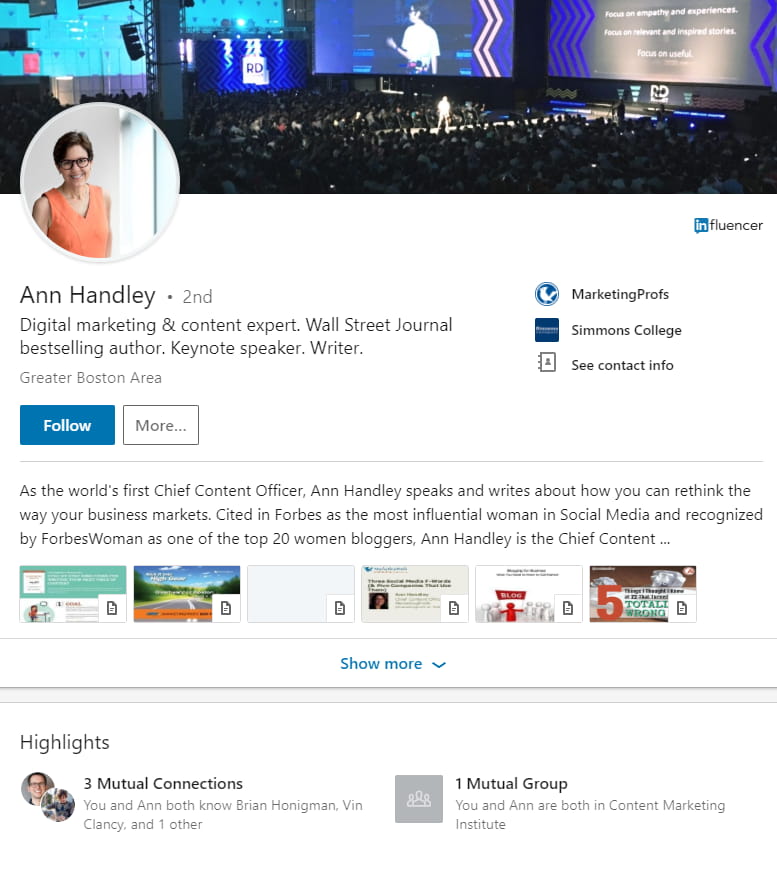
Pinterest marketing is insanely popular, especially among Gen Z and Millennials. Over 465 million people use this visual pinning platform every month to find inspiration and their next purchase. Like Instagram, Pinterest thrives on imagery and inspirational content where products serve as the proverbial centerpiece.
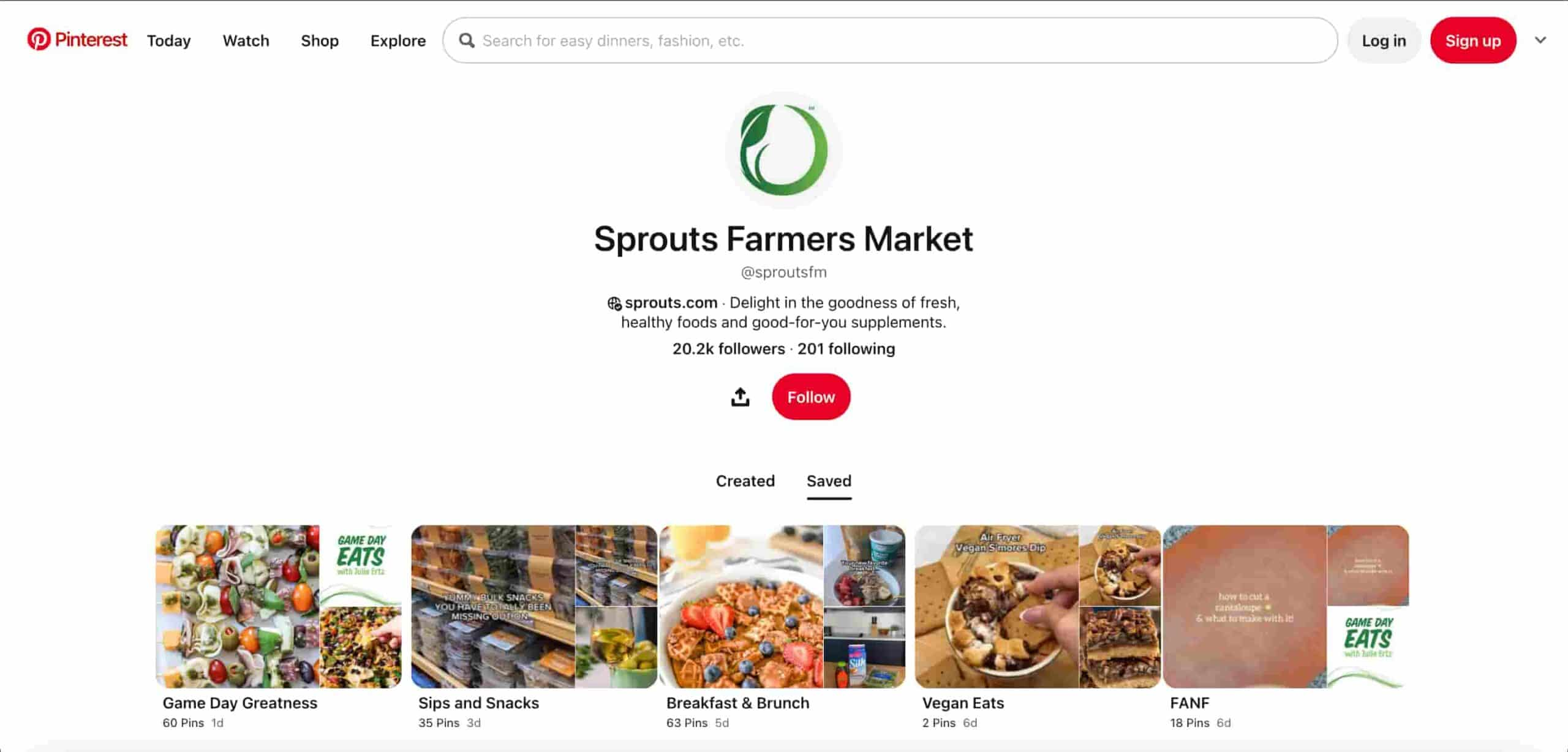
TikTok
TikTok remains one of the most popular apps in the world. Along with its viral trends and niche communities, the short-form video app is known for its hyper-personalized algorithm that keeps users scrolling for hours. TikTok marketing has changed the game for brands, allowing them to connect with customers in an entirely new way.

Looking for more in-depth data on other platforms? Explore key Snapchat statistics to understand its audience and usage trends.
YouTube
YouTube has gone beyond being a video-hosting platform, transforming into the world’s most popular search engine, second only to Google. And considering that video represents the top-performing type of content across nearly every social network, YouTube is a great place to house your videos and optimize them for search and lead generation.
In fact, according to The 2026 Content Strategy Report, consumers want brands to post entertaining content but also content that educates them about their products and services.
Picking networks for your social media marketing strategy
There are more than 15 social media platforms your brand can use, but don’t spread yourself too thin. Consider those platforms that make the most sense based on your industry and target audience.
Do your homework on your existing social media audience and focus on networks where your core audience is already active and determine how you can segment them. That’s why many brands use a social media marketing dashboard that provides an overview of who’s following you and how they interact with you on each channel.
For example, Sprout’s analytics dashboard puts your audience demographics front and center. It highlights which social networks see the most activity, helping you ensure you spend your time on the right network.
You can also use analytics to determine if you should create a new social media account. With Sprout, you can view X, Facebook, Instagram, LinkedIn, YouTube and Pinterest data side-by-side in a customizable format that’s exportable by date range and profile.
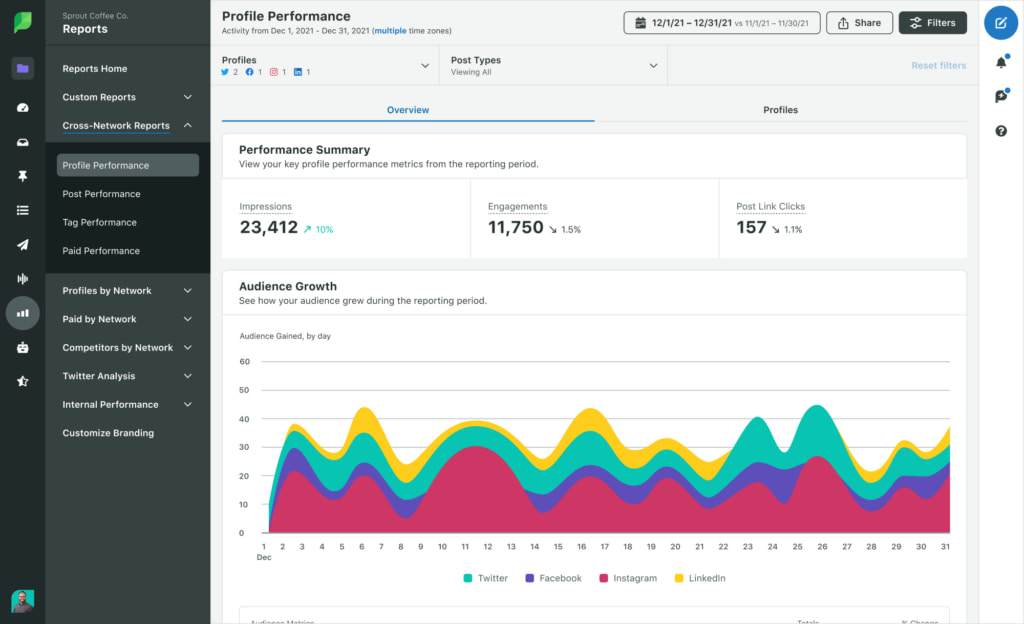
There are plenty of other sources of valuable audience data to supplement your social media insights. This includes your Google and email analytics, CRM, customer service platform, and even your best-selling products.
All of the above will ultimately influence everything from your marketing messaging to how you’ll approach customer service or social commerce.
Step 3: Create (and curate) timely & engaging social content
No surprises here. Your social media marketing strategy hinges on your content. At this point, you should have a pretty good idea of what to publish based on your goals, audience and brand identity. You probably feel confident in which networks to cover, too.
But what about your content strategy? Below are some tips, ideas and inspiration that can help.
Defining your content strategy
Coming up with a content strategy might seem like a lot of legwork, but in reality, it all boils down to your goals.
For example, Nike builds its entire social media strategy around inspirational storytelling to foster a deep, emotional connection with its audience.
- Looking to educate your audience in the B2B space? Publish blogs, news and opinions relevant to your industry.
- Trying to push e-commerce products? Post action shots of your products and photos of others showing off your swag.
- Focused on customer service? Tips, shout-outs and company updates are fair game.
To ensure your content remains focused and aligned with your brand’s objectives, you can build your content plan around a set of social media content pillars.
Regardless of what you might post, coming up with a hashtag to couple with your content is a brilliant branding move.

Hashtags can be used to get your attention and encourage people to share their photos interacting with your brand.

Find your brand voice
One of the best ways to stand out on social media is to have a distinct brand voice. Chances are you’ve seen a post from a particular brand that just feels like, well, theirs.
The quippy, casual tone that makes Discord’s X presence beloved by casual users and moderators alike is a great example.
The key is to present yourself as a human rather than a robot. Adopt a consistent brand voice and style that’s appropriate for your business.
To move beyond one-off posts and build a cohesive brand identity, consider developing a social media content series that reinforces your core values and keeps your publishing calendar consistent.
Bake timeliness into your strategy
Timeliness is arguably more important than ever for marketers. Not only are you expected to put out fresh content regularly, but also to always be “on” for your followers. But you can’t always expect customers to operate on your clock. Plus, timeliness is a tall order when you’re strapped for resources or are part of a small team.
As evidenced by our best times to post on social, brands have a lot of ground to cover in terms of frequency and how much content to push. It’s important to pay attention to the optimal times for engagement so you can automate the most tedious aspects of your social presence without having to worry about posting in real time.

Another important factor is ensuring you respond to customer comments in a timely manner. If you’re strapped for time and have a small team, consider taking advantage of chatbots and AI & automation to ensure you’re engaged with your customers so you can serve and engage with customers when your team is offline, which leads us to our next point.
Take advantage of short-form video
Thanks to the rise of TikTok and Instagram Reels, social video is booming. Short-form productions continue to dominate the social space across all platforms due to their high engagement rates.
Thanks to advancements in DIY and remote video production, you don’t need massive budgets to be successful. All you need is a laptop or smartphone and a few tricks of the trade, like video length best practices and editing tools.
Share posts that show off your brand’s uniqueness and human side
Both personal and personable content should be a cornerstone of your social media marketing strategy. Don’t be afraid to remind followers of the humans behind your posts. According to the latest Index, consumers crave original, entertaining and humanizing content from brands.
For example, Zoom has excellent original content on their Instagram and TikTok accounts, like this Reel that explores the different signs in the workplace:

Step 4: Collaborate with influencers
If you haven’t already, it’s time to tap into the power of influencer marketing. Social partnerships are very effective when executed correctly. They can help drive traffic to your website, produce compelling content and inspire purchase decisions.
But consumers care about creators’ qualifications, so choose wisely. The two most important qualifications of content creators working with brands is their experience with the product/service and their authenticity.
Identify creators who align with your brand and consider how they can help you craft stand-out content for your audience.
What consumers want from influencer-brand collaborations
According to the 2024 Influencer Marketing Report, consumers overall look to engage with influencers who align with their personal values (53%) and seem authentic (47%), even when posting sponsored content and taking part in brand campaigns.
Across ages and genders, honest and unbiased content stops audiences mid-scroll, while aspirational content is least likely to catch their attention.
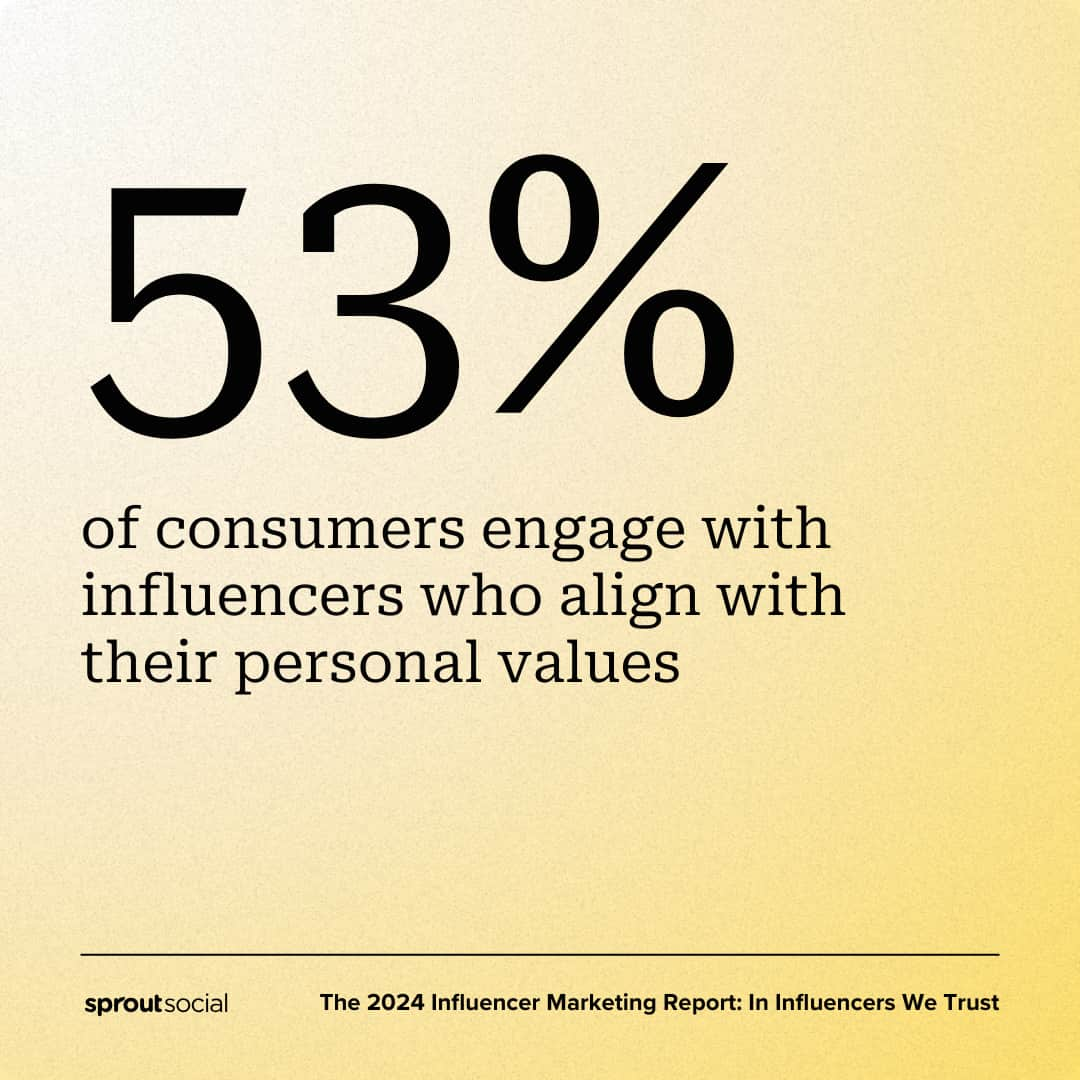
However, the report also found that authenticity is losing its appeal among younger generations. While trust in influencers remains strong—and is even growing among younger consumers—only 35% of Gen Z value authenticity, compared to nearly half of Millennials, Gen X and Baby Boomers.
This indicates that younger generations are more aware of the influencer-brand relationship and how it influences their buying decisions, but they’re comfortable with it. Instead, they prioritize other indicators of trustworthiness, such as follower count, posting frequency and community loyalty.
Step 5: Bring other departments into the mix
Social media teams have a unique advantage when it comes to understanding customer sentiment. You’re the eyes and ears for your brand online. Those insights can do more than just inform your marketing strategy.
They can transform your business. Stand-out social media teams will approach cross-department collaboration with enthusiasm and intention.
Which departments can benefit from social data?
The short answer? All of them. Index data shows around three-quarters of marketing leaders already say organic and paid social marketing are top priorities for the organization.
However, don’t bite off more than you can chew. Instead, start where you think you can make the most impact. Here are a few ideas to jumpstart your strategy.
Human Resources
Collaborating with human resources on social-first employer brand initiatives can do more than just fill open roles quickly. It can attract stronger, more qualified candidates as well. Many companies have embraced social recruiting strategies, such as publishing creative “we’re hiring” posts on LinkedIn to attract top talent.
Sales
Data from The 2023 Sprout Social Index™ notes marketers planned to track conversations and sales directly resulting from social efforts in 2024 to better connect the value of social to business goals. Sharing social insights with your sales organization can empower reps to work smarter in the context of increasingly digital customer journeys. Consider learning more about social selling to leverage the power of online networks even further.
Product and merchandising
You’ve probably received quite a few feature or product requests while managing your brand’s social inbox.
With a social media management tool, you can distill those messages into actionable insights for your product or merchandising teams. These insights can complement existing roadmap research, creating a customer-focused plan that delights.
Customer care
Monitoring customer service metrics like average reply time, average wait time and response volume can help your social customer care team identify what’s working well and spot opportunities for improvement. Marketers are using social media customer service software to elevate their support strategies and get the most out of their tech stack. These metrics are vital inputs for a larger, comprehensive customer experience management (CXM) strategy, ensuring social media support aligns with overall brand service standards.
Step 6: Evaluate and improve your social media strategy
By now you should have a big-picture understanding of your social media strategy. However, it’s important to adapt your strategy throughout the year.
Without continuously analyzing your efforts, you’ll never know how one campaign did over another. Having a bird’s eye view of your social media activity helps put things into perspective. This means looking at your top-performing content and adjusting your campaigns when your content stalls.
There’s no denying that a lot of social media is a matter of trial-and-error. Monitoring the metrics behind your campaigns in real time allows you to make small tweaks to your social media marketing strategy rather than sweeping, time-consuming changes.
Doing social media marketing right starts with being diligent about your data. You can be reactive in the short term to get the most out of your running campaigns, and then proactively use these takeaways to inform your next strategy overhaul.
To guarantee that you get in front of as many customers as possible, monitoring your growth is a major must-do. With Sprout, social reports can clue you in on everything from your top-performing content to how engaged your audience is. These reports are crucial for accountability and guaranteeing your numbers continue to tick upward.

Reporting on data is also important for the sake of sharing valuable insights from social with your coworkers and colleagues. Remember that 60% of organizations use social data daily—be one of the brands that embrace it.
Sharing this information in regular reports not only holds you accountable for your efforts but also highlights the impact and bottom-line results your social strategy produces. Based on your data, you can better assess whether your KPIs truly ladder up to your overarching company goals or whether they need to change.
How do you maintain an effective social media marketing strategy?
Maintaining an effective social media marketing strategy requires a balance of planning, execution and continuous optimization. Here are focus areas you’ll need to pay attention to to ensure your strategy remains evergreen.
1. Secure executive buy-in and engagement
Winning leadership buy-in is one of the most important factors that can ensure your social media marketing strategy is a success. Approaching it in a layered manner and showcasing how your social media strategy is impacting your business, with tangible data, can help.
- Show ROI: Use data and insights from social listening (e.g., customer sentiment, competitive analysis) to demonstrate the business impact of social media.
- Make it easy: Provide curated content and pre-drafted posts to simplify their participation.
- Highlight thought leadership: Position executives as industry leaders by sharing insights, trends, and personal perspectives on LinkedIn or other social media channels.
- Tie it in with employee advocacy: Encourage executives to engage organically by responding to comments and participating in conversations that align with company values. Plus, amplify your employee advocacy by encouraging employees to share brand content that’s already curated.
- Frame it as an executive summary: When looking to prove the impact of your efforts and secure buy-in from senior leadership, having a well-articulated social media strategy executive summary is essential for quick, easy alignment and showing the straight route to measurable success.
2. Ensure you’re not deviating from your set goals and KPIs
Now that you have broader organizational support, create guardrails so you’re on track with your goals. To do this, it helps to define what success looks like—is it brand awareness, engagement, lead generation or conversions? Align your KPIs (followers, reach, CTR, engagement rate) with your objectives.
3. Build on your influencer marketing efforts
The 2024 Influencer Marketing Report found 49% of consumers make purchases at least once a month because of influencer posts. This means influencer marketing can have the most impact on your business compared to your other social efforts. To ensure you get the most of your influencer ROI, integrate an influencer marketing platform into your existing tech stack. This will help you automate data collection and analysis and enable you to track and measure the impact of influencer-led campaigns on your revenue.
Sprout Influencer Marketing integrates into your martech stack seamlessly so you can search for the right influencers and collaborate with them, streamline influencer workflows, and manage influencer compensation and campaigns, all through a unified dashboard.
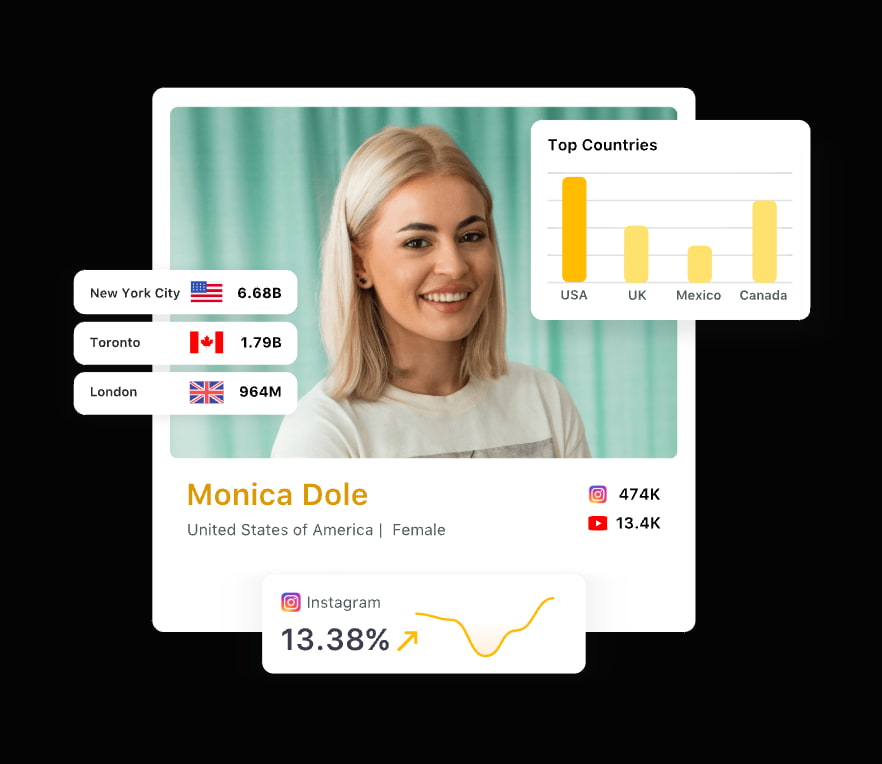
4. Take advantage of AI & automation
Use AI for smarter workflows and get time back to focus on strategy. Use AI and automation for content recommendations, content creation, automated posting and sentiment analysis for brand insights. Similarly, implement chatbots on your social channels for instant customer interaction and improve customer support.
This video highlights how Sprout’s Bot Builder helps businesses.
You can also use AI to automate reporting to track performance efficiently and provide different teams with the exact data and insights they need.
Social media marketing gives you access to real-time data on customer experience and shifting consumer preferences. Having this data at your fingertips ensures you’re making decisions that go beyond personal feelings and anecdotes and are based on tangible evidence.
“With this comes a greater ability to show that specific initiatives, types of content, themes or campaigns have or have not supported KPIs that we’ve identified as important to what we’re trying to achieve. When you have that level of data available, and in an easy-to-set-up way, it unleashes a lot of power in your decision-making and decision backing.” Peiffer explains.
5. Use in-depth reporting to prove social ROI
One of the benefits of social media marketing is that you get comprehensive audience and campaign performance metrics easily and quickly to ensure you’re aligned with your primary goals.
For example, with Sprout’s My Reports tool, you know exactly what metrics align with your business priorities and how to turn that engagement into tangible results. This makes it easy to prove your social ROI because now you can easily showcase how your social marketing strategy is performing, driving leads, and helping with your brand’s integrated marketing strategy.
Rachael Goulet, Director of Social Media at Sprout Social explains how her team uses My Reports.

Since My Reports are also highly customizable, it’s easy for social media managers to pull the exact KPIs leadership teams and stakeholders are interested in and reveal the impact of social on the brand and business.
“When you have five minutes to present to other key stakeholders at the executive level, they are looking for fast, quick takeaways. Sprout allows us to pull just that much information that’s customizable for those key stakeholders. We can even automate it, such that, if they have a monthly check-in, for example, and they just want to know how some of our strategic priority areas are performing at that time, we can pull KPIs specific to those areas.” Peiffer notes.
Through reporting on social data you’re also able to achieve greater transparency and accessibility through meaningful metrics. “Data-driven decision-making is being built into the culture beyond our social media and web team, because we can build greater transparency and accessibility using reporting and social listening dashboards,” she says.
“Because these reports are highly visual, and can be as robust or simple as we need them to be to communicate with key stakeholders, it allows us to empower really anyone to communicate the results of our efforts on social media in a way that is meaningful to their goals—whether that be an executive to a governance council, a director to our dean or an account manager to a service line physician,’ Peiffer adds.
6. Focus on audience segmentation and tracking
Social media marketing enables businesses greater segmentation and tracking through platform-specific data and insights from AI-powered tools like Sprout. You can target audiences based on demographics, interests, behaviors and even sentiment analysis through social listening. Plus, advanced targeting features like custom and lookalike audiences can ensure your ads reach the most relevant users.
As Sprout customers, Penn State Health has used Sprout’s Tagging feature to help benefit from improved segmentation and tracking for their marketing and communications objectives on social media. “The tagging architecture within Sprout has really allowed us to have greater segmentation and tracking for those separate and distinct audiences and also the variety of content that we’re putting out,” Peiffer notes.
AI-powered analytics further helps track engagement, conversions and customer journeys. This will enable you to tailor content to audience personas and optimize campaigns in real-time for better social ROI and audience alignment.
7. Optimize your content strategy
Content that resonates with your customers, including user-generated content and success stories, often goes hand-in-hand with higher engagement and conversion rates. Social gives you the advantage of curating this impactful content quickly. For example, you can monitor mentions and tags to uncover positive customer interactions and then share them on your social media channels to nurture brand trust.
Many brands also curate customer photos to use throughout their marketing campaigns. This is why having a branded hashtag is so important. By encouraging your customers to tag their content, you can find shareable posts that your followers will love while also making a connection with your customers. You can manage this process effectively through a dedicated UGC platform.
A Publishing Calendar can also be useful to ensure your curated content is posted at a consistent rate to ensure you have a steady brand social media presence.
However, when it comes to cyclical content, constantly creating awesome content can be taxing—a challenge all brands face. AI in social media can help overcome this block and even enhance creativity.
“There’s only so many ways over time I can think to say it’s National Doctors Day, thank a doctor who has made a difference in your life,” Peiffer explains. “As social media managers, we can use tools like generative AI to get ‘unstuck’ in these creative blocks and tailor it to our own brand voice and audience preferences,” she adds.
Sprout’s AI tools have made a difference in how Penn State Health’s social team creates brand content. “I appreciate that Sprout gives several options when generating text. I’m sometimes pulling from this piece and adding it to another, or it just inspires a wholly separate thought and I’m writing something entirely different. That inspiration saves time and helps find a new way to say the same thing,” Peiffer notes.
Generative AI tools like Sprout Social’s AI Assist in Compose can help you create content easily. All you have to do is add a few thoughts or drop a link and you get multiple caption options in different tones. Similarly, the Suggestions by AI Assist capability helps improve social media posts by instantly generating multiple variations of the post or adjusting its tone.

Yet another important way to optimize your content strategy is to have a balanced mix of videos, infographics, carousels and user-generated content to create multi-format content and keep engagement high.
It’s also important to align content with your brand persona and not jump on every trend you see on social. The 2025 Sprout Social Index™ revealed this as one of the top things consumers want brands to stop doing.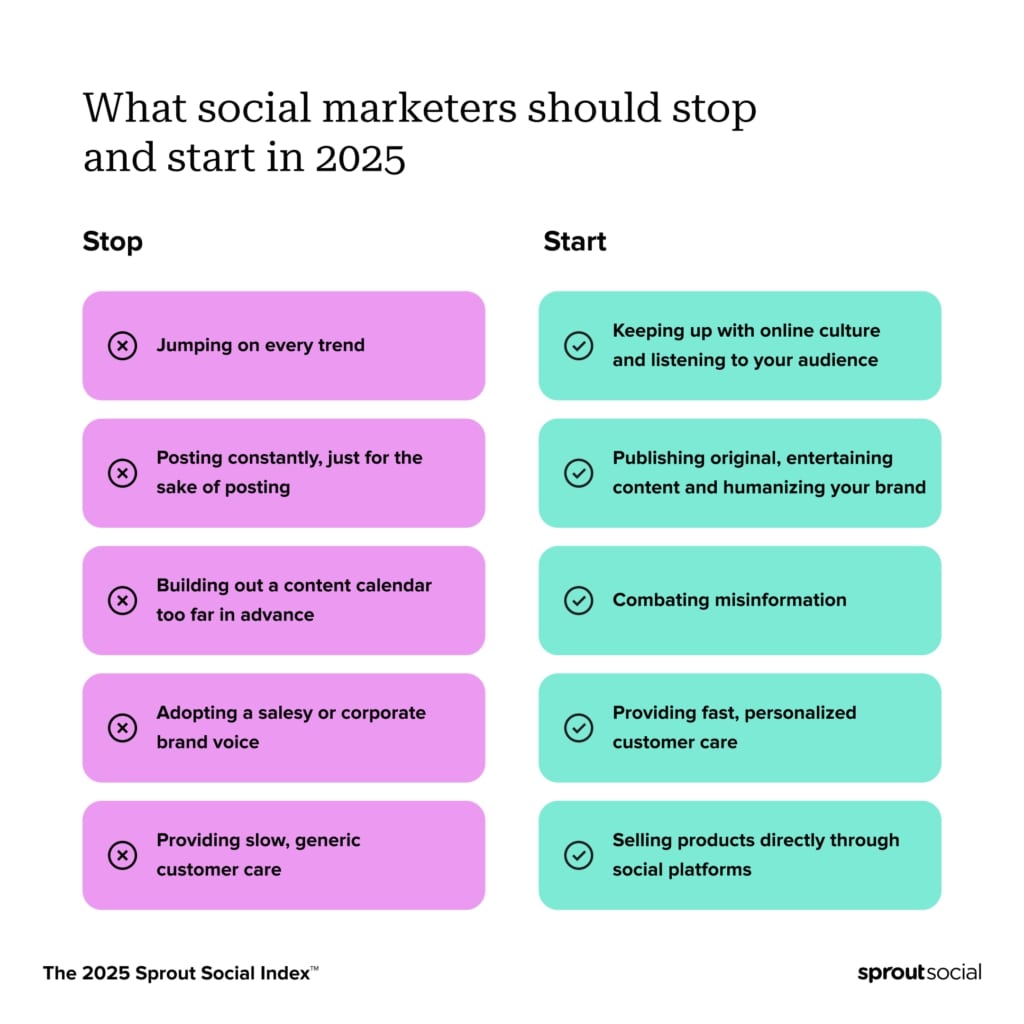
8. Champion workflow efficiencies to empower your team
Brands need to be constantly accessible to customers because with social, customers are just a touch of a button away from brands they want to reach. This can also mean overwhelmed social teams balancing customer support, content management and slicing and dicing data for reporting.
However, with an intuitive social media management solution, this daunting task can become easy as pie. According to Amy, Penn State Health’s social team was able to build custom reports faster and more efficiently, such that the time to build customer reports dropped by nearly 70%. They also reduced errors by 80% and troubleshooting turnaround time from 3-5 days to within an hour.
This collective efficiency helped save team resources as well. “We eliminated the need for an additional contractor-supported role due to efficiency gained for full-time team members,” Peiffer explains.
This video explains how the Sprout team uses our own tool to save time and increase workflow efficiency.

9. Prioritize social customer care
Per the latest Sprout Social Index™, among the top things customers want brands to start doing in 2025 is prioritizing quick, personalized customer care.
Social Customer Care by Sprout Social helps brands achieve this. Whether it’s through Case management that enables global customer care teams to be on the same page or tools like Saved Replies that help deliver quick service while maintaining brand voice, you deliver the best customer experience ever, and more importantly, humanize your brand.
Peiffer says, “What we found in years of inquiries was that there were certain themes and frequent requests to our social media pages. Using Sprout, we built Saved Replies that centralized how to locate those resources for our audiences, but could still be individualized and customized to impart that humanity to our social media communications, which I think is so important in health care. In Sprout, we’re able to unlock this potential and allow our team to focus on more strategic objectives.”
10. Engage and build community
This brings us to customer engagement and building your own brand community. One of the ways to nurture a thriving brand community is to respond to comments and messages promptly. Tools like Sprout’s Smart Inbox or Message Alerts help you in doing that because they automatically categorize messages according to priority.
Collaborate with brand advocates to extend your reach and infuse your social media with authentic, relatable content. Plus, encourage user participation through polls, Q&A and challenges. This will help you grow and sustain your brand’s community with loyal followers.
11. Analyze and iterate your efforts
Analyze and track your efforts consistently. This includes testing your ad creatives, captions and posting times to ensure they are optimized for your audience. Tools like Sprout’s Suggestions by AI Assist and ViralPost ™ capabilities enable you to do just this.
Analyze your content performance as well and use that data to refine your approach. With Sprout’s Tagging feature, you can pull tag-based reports that make it easy to assess what makes something resonate with your audience and see how it aligns with your strategic priority area. You can see what’s performing well and apply those data-backed learnings to other projects to build your annual campaigns.
This approach has also helped Penn State Health win executive buy-in. “The ability to customize how specifically we want to be able to sort, filter and measure data has allowed us to build really enhanced reporting that provides sometimes real-time feedback to stakeholders in ways we haven’t always been able to,” Peiffer says.
“It’s something that not only allows us to plan better as we’re laying out our campaigns and our social strategy for the year, but then also to go back and to report to others when they say, I don’t understand why you did this, or I don’t understand why we don’t do something else. We have the data and the insights available to communicate effectively why our decisions are what they are and to support them as we go forward,” she adds.
While the fundamentals of social strategy apply to most sectors, high-end sectors may require a more nuanced approach to exclusivity. For a deeper dive into this, explore how to tailor a luxury brand social media marketing strategy that resonates with affluent audiences in the UK.
Another important factor is to keep track of platform algorithm changes so you aren’t caught off-guard and adapt your strategy accordingly.
This cohesive approach will also enable you to create benchmarks that you can lean on for future campaigns.
Ready to make your social media marketing strategy future-proof?
If you set actionable goals and address each of the steps above, you’ll already be way ahead of the curve when it comes to your social media marketing strategy.
Try out some of the Sprout Social features we shared in this article and explore how your business can advance with greater consistency and impact.
Sign up for a 30-day trial today.
Social media marketing strategy FAQs
What is the role of social media tools in social media marketing strategy?
Social media management tools are essential for streamlining and amplifying a social media marketing strategy. They automate repetitive tasks, provide critical data for informed decisions, and enable businesses to manage their presence across multiple platforms efficiently. Here’s the role of social media tools in a marketing strategy:
- Scheduling and Publishing: Social media management tools let you plan and schedule posts in advance. This ensures a consistent posting schedule without requiring you to manually post in real time, saving significant time and effort.
- Analytics and Reporting: These tools provide detailed insights into your performance. They track engagement, reach, and follower demographics, helping you understand what content works best and allowing you to adjust your strategy for a better ROI.
- Audience Listening and Monitoring: Social listening tools monitor conversations about your brand, competitors, and industry trends. This provides valuable insights into customer sentiment and helps you identify opportunities and address potential crises.
- Team Collaboration: For larger teams, social media management platforms provide a unified dashboard where team members can collaborate on content, manage customer inquiries, and ensure a consistent brand voice.
- Optimizing for ROI: Social media tools are crucial for proving the return on investment (ROI) of your efforts. They provide the data reports and custom dahsboards needed to show which campaigns are generating leads, driving sales, and contributing to overall business goals, justifying the investment in your social media strategy
How do I measure the success of my social media marketing efforts?
The success of social media marketing is measured by analyzing key performance indicators (KPIs) that align with your business objectives. By tracking the right metrics, you can understand your audience, optimize your content, and demonstrate a clear return on investment (ROI). Here are five key metrics to measure the success of your social media marketing efforts:
- Engagement Rate: This measures how actively your audience interacts with your content. It’s calculated by dividing the total number of likes, comments, and shares by the number of followers. A high engagement rate shows your content is resonating with your audience.
- Reach and Impressions: Reach is the number of unique people who saw your content, while impressions are the total number of times your content was displayed. These metrics show how widely your brand’s message is being seen.
- Click-Through Rate (CTR): This metric measures the percentage of people who click on a link in your social media post. A high CTR indicates that your call-to-action (CTA) is effective and driving traffic to your website or a specific landing page.
- Conversion Rate: This tracks the percentage of users who complete a desired action, such as making a purchase, signing up for a newsletter, or downloading a guide, after clicking on a social media post. It directly links your social efforts to business results.
- Audience Growth Rate: The audience growth rate the pace at which your follower count is increasing over time. It helps you understand if your strategies are effectively attracting new followers and expanding your brand’s community.
Additional resources for Social Media Marketing
Social-first brands: Redefining culture and business strategy
How to build a top-tier SaaS social media marketing strategy
Luxury brand social media marketing: Strategies by UK brands that scale globally
How to build a social media portfolio that proves your impact
How to use Pinterest to grow your brand in 2026
Social media marketing for UK fintech: How to build trust and stay compliant
Social media marketing for Australian ecommerce: Turn connection into growth
Social media marketing for sustainable ecommerce brands in Australia: 8 effective strategies
The future of social media: 7 expert predictions for 2026
How to build a customer-centric B2B social media strategy
Video marketing for ecommerce: A guide for Australian brands
8 winning holiday marketing strategies for 2025
11 UK social media marketing conferences in 2025
Top 8 social media conferences for Australian marketers (2025)
20 engaging Instagram post ideas for UK businesses
Australian TikTok video ideas that convert
Everything you need to know about WhatsApp marketing
How to maximize your social strategy with video SEO
25 social media post ideas for UK brands
How to use social media memes in your marketing strategy to drive engagement
Why social media shares matter in 2026 (+10 engagement tips)
Reddit marketing: How to reach and connect with your audiences
Social media marketing: What it is and how to build your strategy
The importance of social media marketing: 7 stats that prove social’s role in business success
The complete guide to using social media for business
A guide to choosing the most effective social media networks for your brand
16 digital marketing platforms to check out in 2026
Target audience: What it is and how to find yours
8 social media myths to unlearn (and dispel across your organization)
8 social media tips from experienced marketers
The complete guide to Pinterest Marketing
What to do when faced with these 10 social media marketing challenges
A beginner’s guide to social media marketing tools
The ultimate guide to Twitter for business
Tumblr is back. What does that mean for marketers?
Sprout on Sprout: How to communicate social media marketing priorities to outside stakeholders
8 marketing campaign ideas that customers will engage with
Social media campaign examples to inspire your social strategy
To see marketing differently, we need to turn the spotlight on social
Twitch marketing: What it is and how brands can do it right
The social media marketer’s guide to infographic marketing
How to build a social media marketing funnel that converts
9 Smart social media tactics you need today
A painless guide to social media marketing for dentists
Please Link Responsibly: Social Media Guidelines for Alcohol Marketing
























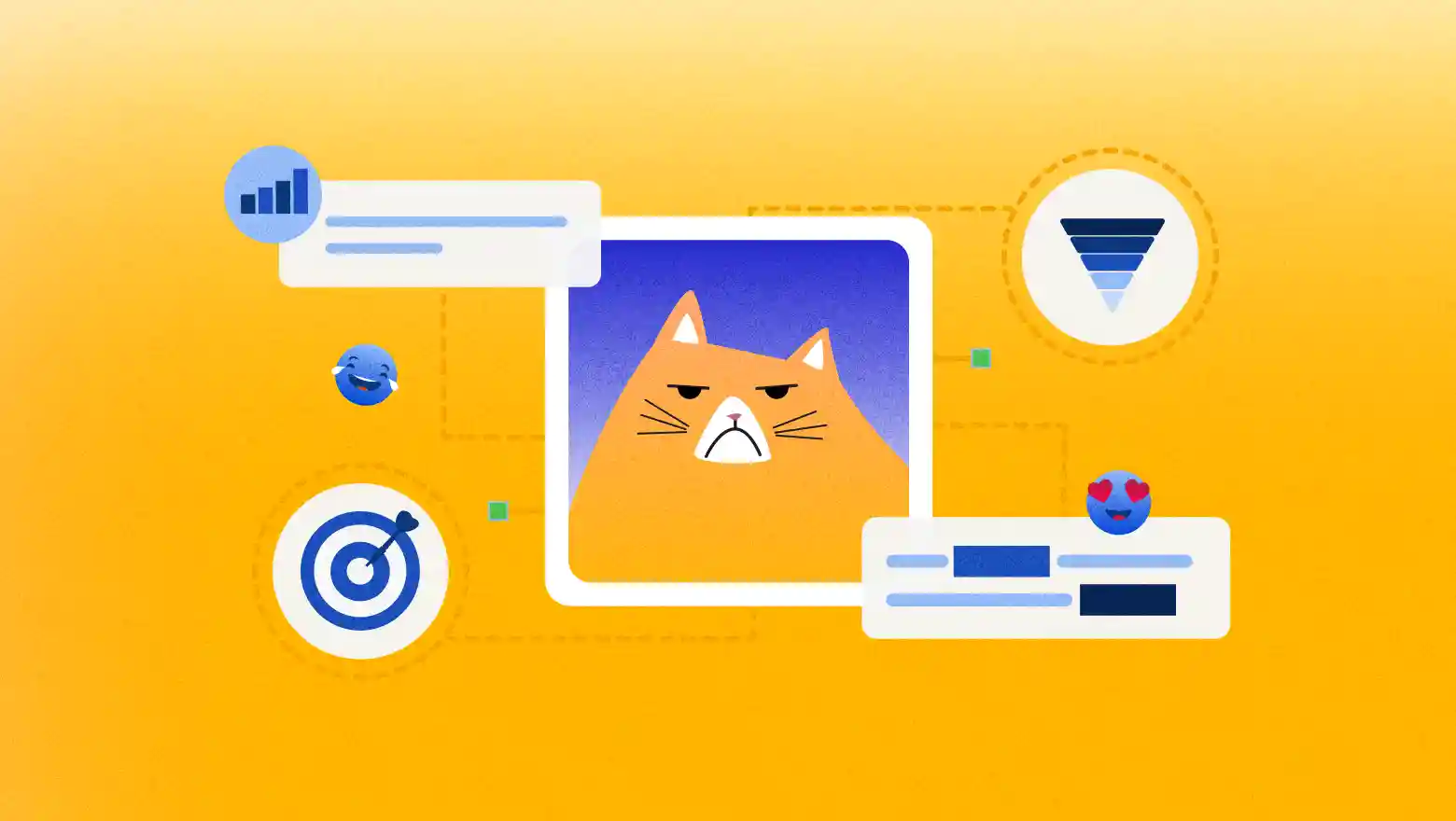


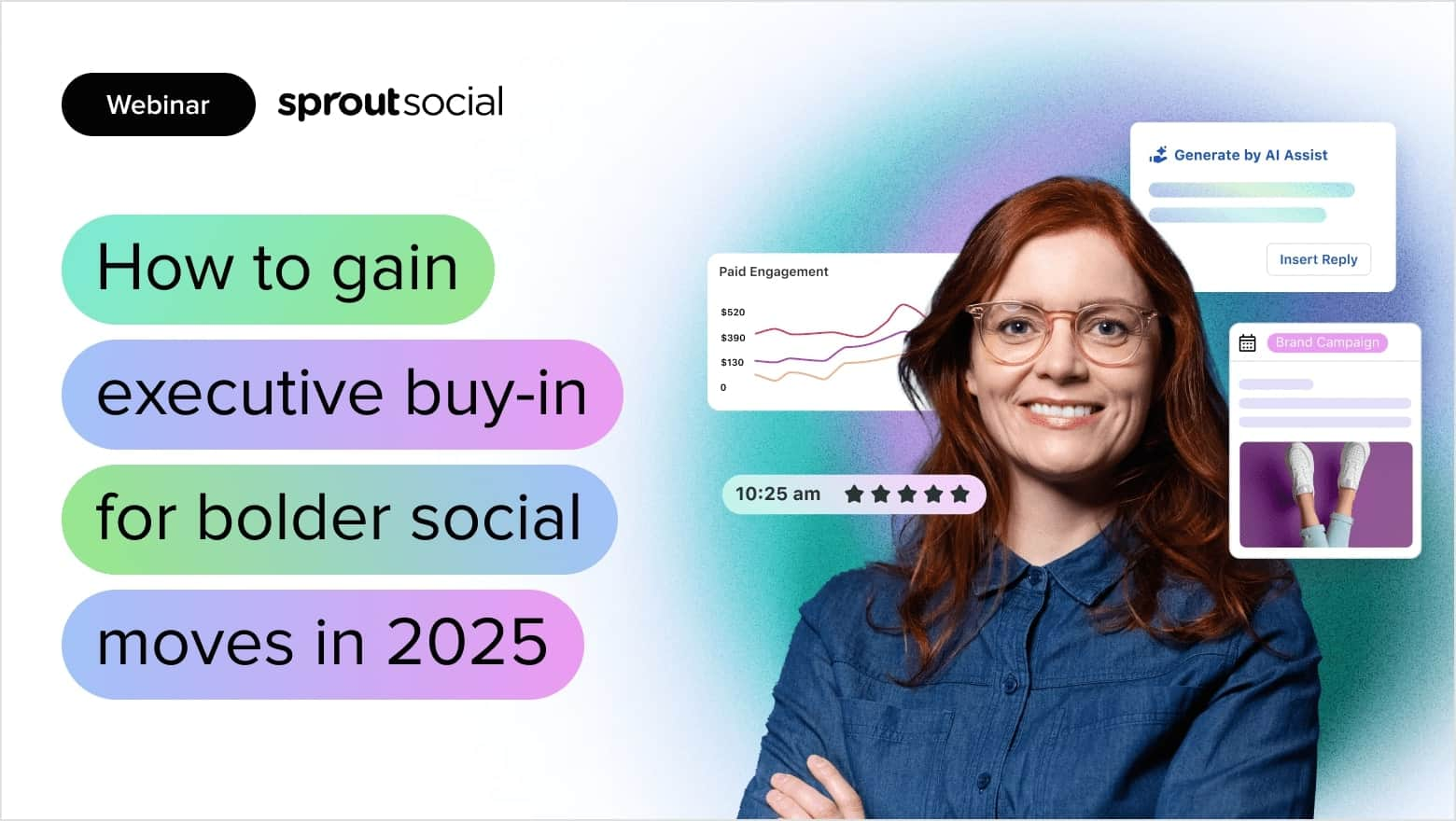










































Share